|
|
Study, work or travel in the UK. British
culture and life.
|
|
|
|
|
|
|
|
|
|
|
|
|
|
|
|
|
|
|
|
|
|
|
|
|
|
|
|
|
|
|
|
|
|
|
|
|
|
|
|
|
|
|
Go shopping in the UK
|
INTRODUCTION
This page gives a brief introduction to shopping in the UK.
Note that some shops offer discounts to students (perhaps 5-10%), especially in
towns with many students. Often they will display a sign in the window advertising
this, but sometimes you need to ask directly. To prove you are a student, you
may need to show your ISIC or NUS card.
If you are paying a large bill, ask if there is a discount if you pay by cash
(the person you are paying will not have to pay the charges of a credit card company)
Back to top
LONDON SHOPS
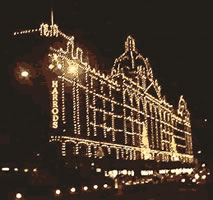
Harrods at night
(Brompton Road, Knightsbridge) |
 Liberty's
Liberty's
(Regent Street) |
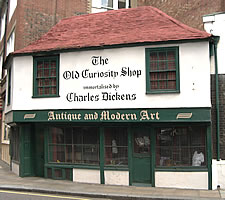 The oldest shop in London (1567)
The oldest shop in London (1567)
(Portsmouth Street, near Holborn) |
Famous London shopping streets: Oxford Street, Regent Street, Bond
Street, Sloane Street, Knightsbridge.
For a guide to the shops along London's main shopping streets, see: http://www.streetsensation.co.uk.
Major department stores in London include the following:
The largest shopping centres within easy reach of London include these:
Back to top
FOOD & DRINK
Some ideas about possible ways to reduce the amount of money you spend on eating
and drinking:
- Eating in school or university canteens will usually be cheaper than commercial
cafes or restaurants
- Cooking for yourself will be cheaper than buying ready-made meals
- When travelling, consider taking some snacks or a picnic with you
- Eating local and seasonal food is cheaper; it may be more expensive if you
try to eat in the same way as in your home country
- It is cheaper to buy alcohol in a supermarket or in a drinks shop, but you
cannot open it there (they are known as "off-licences")
It is usually cheapest to buy food from a large supermarket such as:
Tesco: http://www.tesco.co.uk
Sainsbury's: http://www.sainsburys.co.uk
Safeway: http://www.safeway.co.uk
Asda: http://www.asda.co.uk
Waitrose: http://www.waitrose.co.uk
Marks & Spencer: http://www.marks-and-spencer.co.uk
When you pay for your shopping in a supermarket and pay using a debit card (such
as Switch), you may be asked, "Would you like some cashback?" Cashback
is just a way of obtaining money, equivalent to using a cash machine.
Some ideas about ways to save money for regular food shopping:
- If you use the same supermarket regularly, you should apply for its loyalty
card; show this each time you shop to collect "points" which can later
be used to buy things.
- Check "best before" or "use by" dates to make sure that
you don't waste food. Supermarkets may sell fresh food cheaply if it is close
to its "use by" date, especially just before a day on which the shop
is closed.
- Goods sold using the supermarket's own label may be cheaper than branded goods,
and the quality is often similar.
- Supermarkets often have special offers such as "two for the price of
one". You can find details on their websites.
- It is often cheaper to buy larger packs than individual portions. You may
want to shop together with a friend and split larger packs between you.
- Fruit and vegetables are usually cheaper and fresher if bought from a market
(see Markets) or at a greengrocer's rather than from
a supermarket
Back to top
MARKETS
Farmers' markets are run by local producers who are selling directly. To find
the locations and times of these markets, see: http://www.farmersmarkets.net/visit
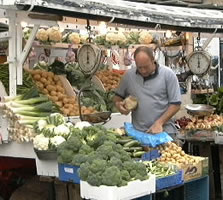 Vegetable stall
Vegetable stall |
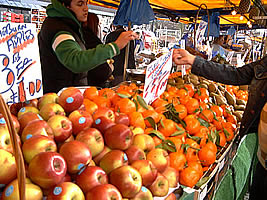 Fruit stall
Fruit stall |
There are many well-known markets in London. Some of the most famous markets are:
Camden Market Market: http://www.camdenlockmarket.com
Crafts, clothes, food stalls. The main markets are on Saturday and Sunday. Near
Camden Town underground station.
Borough Food Market: http://www.boroughmarket.org.uk
Fine food market on Saturday (also on Thursday and Friday afternoons). Near London
Bridge underground station.
Petticoat Lane Market, Brick Lane Market, Old Spitalfields Market:
http://www.eastlondonmarkets.com
Clothes, leather goods, records, toys, organic food. The main markets are open
on Sunday morning. Near Liverpool Street underground station.
Columbia Road Flower Market: http://www.eastlondonmarkets.com
Flowers, plants and vegetables. Open on Sunday morning. Near Old Street underground
station.
Portobello Road Market: http://www.portobelloroad.co.uk
Antiques, fruit and vegetables, clothes and books. The antique market is on Saturday.
Near Notting Hill Gate underground station.
This market was shown in the film Notting Hill.
Covent Garden Apple Market: http://www.coventgardenmarket.co.uk
Crafts (Tuesday to Sunday) or antiques (Monday). Near Covent Garden underground
station.
The story for the film My Fair Lady was based in this area, but the flower, fruit
and vegetable market is no longer here.
Berwick Street Market:
Fruit and vegetables. On Berwick Street and Rupert Street, in the area known as
Soho. Open Monday to Saturday, 9am - 6pm (there may be bargains shortly before
closing time). Near Piccadilly Circus underground station.
Greenwich Market: http://www.greenwich-market.co.uk
Crafts, antiques, books. Near Cutty Sark station (Docklands Light Railway).
Back to top
BUYING CLOTHES
Burton
(menswear) offers 10% discount to students (you need to provide a valid student
identification number)
Dorothy
Perkins (womenswear) offer 10% discount to anyone ordering online
Designer discount stores sell designer goods at reduced prices. See: http://www.designerdiscount.co.uk
Cheap second-hand clothes and other items may be available from charity shops,
located in many high streets
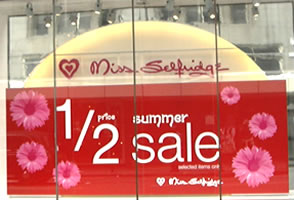 Summer sales
Summer sales |
The biggest sales are usually after Christmas (late December / early January;
see: Ideas/Gifts/JanuarySales).
Summer sales are in July or August.
Although sale signs appear to say something like "Sale: 50% off",
if you read the small letters it may read "Sale: up to 50% off, on
selected items only". |
Clothes
If you are small, some shops offer petite ranges
The most common labels for clothes are: S (small), M (medium), L (large), XL
(extra large), XXL (extra extra large)
Shoes
British shoe sizes are different from those in other countries, so always ask
to be measured and try on shoes before buying them.
Back to top
BOOKS & STATIONERY
Ask bookshops if they offer student discounts (10% discounts are fairly common).
Some bookshops have special student promotions - often at the start of the academic
year (in September or October).
Some bookshops sell second-hand books (for example: popular course books) at reduced
prices. Bookshops which are close to universities are most likely to have this
kind of service. Student unions sometimes organise second-hand academic book sales
on campus.
Many books are cheaper if bought online through companies such as Amazon: Shop/Company/Amazon.
Used books are often available through this service.
Second-hand academic books can be bought online from: http://www.academicbooktrade.co.uk
Two of the biggest stationery companies are Ryman
and WH
Smith
Back to top
HAIRCUT
A man's hairdresser is also known as a barber.
Usually you do not make an appointment at a barber's shop - you go to the shop
and wait for your turn.
You should try to remember who was already in the shop when you arrived, and who
arrived after you.
The basic service is just a haircut; you should ask if you want your hair washed
or if you want a shave
The parts of the hair are known as the back, sides, top and
fringe (at the front; known as bangs in American English). The areas in
front of the ears are known as sideburns. At the back the hair can be tapered
or square.
If you want short hair, you can ask for a short back and sides.
You can specify the length of hair which is cut using a shaver as number 1
(shortest), number 2, number 3 or number 4 (longest).
If you comb your hair to one side, you should ask for a parting, either
on the left or right.
You can ask for a trim or a tidy-up if you don't want much to be
cut from the top and fringe.
It is common to give a tip of about 10% to the hairdresser.
A hair salon is more expensive than a barber's shop. You normally need
to make an appointment before going.
Some are just for women, but many are unisex (for either men or women).
If you have a particular style that you want, it may be easiest to show a photograph
to the hairdresser.
If you have hair that is different from British hair, you may want to look for
a specialist hairdresser, for example for Afro-Caribbean or oriental hair.
There may be different charges if your hair is cut by a senior stylist, junior
stylist or apprentice (a learner).
If you want to save money, you may be able to get a free haircut by an apprentice.
Some of the services offered are washing/shampooing, cutting, styling, colouring,
blow-drying, hair extensions, a perm, and colouring/highlights. Some hair salons
also offer beauty treatment.
Back to top
ONLINE SHOPPING
Many goods can be bought more cheaply if you order them using the internet. In
most cases you will need to pay using a credit card or debit card.
This website includes links to books and other products which can be bought from
Amazon. For more information about how to buy using this service, see: Shop/Company/Amazon.
To buy goods using an online auction service, register at: http://www.ebay.co.uk
To compare online prices, try a site such as http://uk.kelkoo.com
See: Life/Post for details about
how to take delivery of a parcel in the UK.
Back to top
VAT REFUNDS
If you buy some expensive goods less than 3 months before you leave the UK, you
may be able to reclaim VAT (value added tax). The current rate of VAT in the UK
is 20%. This table shows how much you may be able to claim back, depending on
the value of your purchase and the current rate of VAT. Note that while the VAT
rate is 20% the reclaim amount is 16.66% of the amount spent (16.66% = 20 / 120):
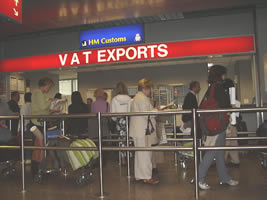 VAT reclaim counter,
VAT reclaim counter,
Heathrow Airport |
Amount
spent
|
Reclaim amount
(if VAT=20%)
|
|
£50
|
£8.33
|
|
£100
|
£16.66
|
|
£150
|
£25.00
|
|
£200
|
£33.33
|
|
£300
|
£50.00
|
|
£400
|
£66.66
|
|
£500
|
£83.33
|
|
£1000
|
£166.66
|
To be able to claim a VAT refund:
- You must be from a country which is outside the EU (European Union)
- You must leave the UK (and the EU) within 3 months of the date when you make
your purchase
- If you are a student then you must be about to finish your studies in the UK.
After you have left you must be planning to remain outside of the UK for a period
of at least 12 months
- You must buy from a shop which takes part in the "Retail Export Scheme"
(these shops will display a "Tax-free shopping" sign in their window)
- Usually you must spend more than a minimum amount in the shop (for example:
£50 or £100)
This is how you claim the money:
(1) At the shop
- When you have decided everything you want to buy, tell the sales assistant that
you would like to reclaim the VAT
- The shop will provide you with a VAT reclaim form for you to complete (the number
of the usual form is VAT 407)
- The shop will ask you to show your passport
(2) At the airport
- Make sure that you pack both the form and the goods you have bought in your
hand luggage
- Show the form, the goods and your passport to the Customs officer at the airport
from which you will leave the EU. Your form will be stamped
- There may be a special box where you can post your VAT refund claim, in the
Departures area of the airport (if you forget to do this, you can also post it
after you have returned to your country). Sometimes there is a Cash Refund Office
in the airport where you can obtain the money immediately. Alternatively, you
can have the refund added directly to your credit card or bank account, or ask
for a cheque to be sent to you.
Note the following points:
- You cannot reclaim VAT on services, such as hotel or restaurant bills
- You cannot reclaim VAT on goods for which the tax is not applied (for example,
for books or children's clothes)
- You cannot reclaim VAT if the shop did not issue you with a VAT reclaim form
at the time of purchase
- You cannot reclaim VAT on goods bought by mail order or through the internet
- Shops normally charge an administration fee, so the amount you save may be small
if you have spent the minimum amount. For example, if the charge is £5 and
you have spent £50, you will only get back £3.33 (= £8.33 -
£5.00)
Further information:
The government office which is responsible for VAT is called Customs and Excise,
which is part of HM Revenue & Customs. You can find out full details
of the rules about VAT reclaims on their website: http://www.hmrc.gov.uk
You can also ask for information by telephoning the Customs' National Advice
Service: 0845 010 9000 (calls are charged at local rates).
Back to top
ETHICAL SHOPPING
In recent years many people have become more aware of the ethical issues connected
with business, and wish to buy products from companies which behave in a certain
way. For example, "fair trade" companies such as Traidcraft (http://www.traidcraftshop.co.uk)
ensure that the producers of their products in developing countries are paid in
a fair and consistent way.
Back to top
LINKS
Buy presents: Ideas/Gifts
January sales: Ideas/Gifts/JanuarySales
British food and drink: Britain/Food
Home page: Home
Back to top
© UK Student Life 2002-2012
* Search this website (www.ukstudentlife.com) or the web:












